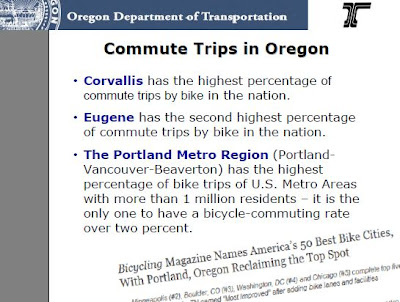Very interesting. As reported in
The Columbian the other day, Republican politicians in Washington's Clark County have issued
a statement calling for a restart on the Columbia River Crossing:
No state-level financing plan has earned the support of either Oregon or Washington legislatures to meet the $900 million they are being asked to pay. There are serious concerns about the use of tolls to fund $1.4 billion of the project’s costs -- concerns about whether tolling projections are flawed and can come close to this funding level, and concerns from citizens unwilling to shoulder the tolling burden for a project that doesn’t meet their needs.
Right now, the CRC does not have a design that will earn the necessary permits to move forward.... [T]he CRC’s Environmental Impact Statement (EIS) is significantly flawed....
Perhaps most troubling about the current design is that the project’s users – the public -- were discouraged from participating from the start. Shielding citizens who will use and pay for this project from its planning process no doubt contributed to design and financing flaws.
Substitute the word "Salem" for "Columbia" and adjust the dollar amounts, and the whole thing maps alarmingly closely to the Salem River Crossing mess!
Some differences remain, of course. In addition criticizing it for being too big, with too many traffic lanes, many in Clark County also oppose light rail. Suburban and exurban autoist critics loathe light rail; rail fans want more choice in mobility and alternatives to the drive-alone trip. The project is getting squeezed from both sides - but both are united in thinking it too big, too ambitious, too costly.
Fortunately in Salem we are still in the draft EIS process, and there's time to redirect this thing to a smaller set of projects, multi-modal in scope, that will actually meet area needs in 2050, and cost a whole lot less.
 |
| Streetcar? There be Dragons! |
Streetcar?
One of the smaller ideas that has been floated is for
a streetcar. It's just at the brainstorming stage, so perhaps it is premature to comment on it. Nevertheless, it seems to me to share some of the same problems that the big highway and bridge has: Relatively speaking, it may be overkill, too complicated and too ambitious of a solution.
It could also dampen other modes of travel.
Two of the key streets, Chemeketa and Union, bicycle advocates hope will become family friendly bikeways. Putting down streetcar tracks, as we have seen in Portland, creates problems. I fear the rail lanes here would cannibalize rather than complement bike lanes, especially on Union and Chemeketa.
Double-decking the Union Street RR Bridge would also put a lid on the bridge, and even in the rain, one of the things I like about it is its openness. I'm not real excited by the prospect of a roof there.
 |
| Street Piano on the Bridge, Summer 2012 |
Finally, is Salem really dense enough for streetcar right now? It seems to me that what made the streetcar work circa 1900 was that we hadn't yet gutted downtown with parking lots and single-use office buildings. I suspect we need more redevelopment downtown first.
In any case shouldn't as a rule we prefer simple solutions to complicated ones? Biking, walking, busing and staggered start times are easier and less costly to implement at the moment. And in the absence of compelling argument these should be preferred to more difficult and more costly solutions like streetcar.
At the same time, we should be brainstorming vigorously, throwing lots of ideas against the wall to see what sticks and holds up. Maybe there's a streetcar configuration that does make sense. Streetcar certainly seems to spur more transit-oriented development than bus lines or bike boulevards - though the results aren't always as clear-cut and robust as some proponents have argued.
For more on the River Crossing / Third Bridge see a summary critique and all breakfast blog notes tagged River Crossing.


















































